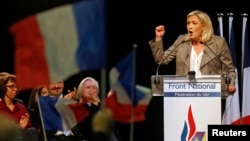Polls indicate France's far-right National Front is neck-and-neck with the main center-right opposition — and far ahead of the ruling Socialist party — ast the country prepares to hold its first-round departmental, or local, elections on Sunday.
The country's struggling economy, high unemployment and security concerns following the Paris terror attacks are strengthening the popularity of Front leader, Marine Le Pen.
It's also popularizing the Front's message as the party begins attracting voters from immigrant backgrounds.
On market day in Le Bois-l'Abbe, a grim housing project perched high on a hill outside Paris, there are stalls of vegetables and fruits, piles of clothes for sale and candidates — lots of them — representing just about every shade of the country's political spectrum.
As Virginie Recher hands out flyers, most people take them, but a few push them away in disgust.
One elderly man says he cannot vote because he's an immigrant.
"It's never too late to get French citizenship," Recher says.
A member of the National Front party, Recher is running for a seat here in Champigny-sur-Marne, a town located in the Val de Marne department outside Paris. This neighborhood — a communist stronghold where many residents are from North and sub-Saharan Africa — doesn't seem the kind of place to sell the Front's anti-immigration, anti-Europe message.
But one woman wearing a headscarf takes a flyer. Asked if she will vote for the Front, she says she does not know.
Recher is not surprised. She says even immigrants here are fed up. They came to France to work years ago. But they say this is not the France they once knew.
Discontent with mainstream parties
Across the country, the Front is riding a wave of voter discontent with France's mainstream parties — the same wave that saw it win 25 percent of the vote in last year's European parliamentary elections. Although expected anti-Front alliances make the party unlikely to capture many departmental seats, far-right expert Jean-Yves Camus says that's not the point.
"The most important topic for the National Front is not how many seats they will win — of course that is of some interest to the party — but how many votes they will get," he said. "Something has changed as to how the French voters see the National Front, which is not seen as an extreme right party anymore, but more a radical right party."
Too many immigrants
Recher says she has always voted for the Front, but that she became an active member after moving closer to Paris a few years ago. She saw sharp social divides in places like Champigny, and for her, just too many immigrants.
She says she is not against immigrants, but France has no more room for them. There's no work, no more housing, she says, and the country should take care of the people who are already here.
Across the street, Smail Mazouni and Farid Ben Ali agree. Mazouni, who is unemployed, and Ali, who sells clothes at the market, discuss the upcoming poll.
Mazouni, who has Algerian roots, says there are times when he has been tempted to vote for the National Front. But the mainstream parties to the left and the right are all the same, he says, adding that they don't talk about the problems that matter — like jobs, housing and health.
Analyst Camus says the Front is not just appealing to immigrant voters.
"When you have a look at the list of candidates, you will see many people with an ethnic background are candidates," he said. "And even people from North Africa, the very minority that the National Front wants to get rid of."
Moderate immigrants
For many immigrants, of course, the Front is not the solution.
Ousseynou Seck, from Senegal, stands across the street from candidate Recher, handing out his own flyers for the center-right UMP party.
The self-professed moderate says he does not share the ideas of the National Front, which he considers extreme.
For many, the upcoming departmental vote is bound to take on broader significance as a kind of testing ground for 2017, when France holds presidential elections.
Le Pen, the Front's leader, is currently polling as France's most popular candidate, one whom French Prime Minister Manuel Valls has warned may one day hold the presidency.
But right-wing expert Camus doubts it. Still, he believes the Front could score well in a runoff, underscoring its growing credibility among many French voters.







